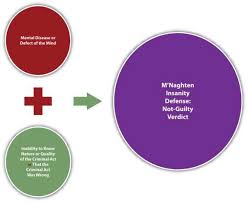 While an insanity defense plays well on television and in the movies, it’s very difficult to prove in a court of law. Most jurors are skeptical of such a defense and believe that the defendant is trying to get off by faking mental illness and incapacity. Secondly, the burden is on the defense to prove “clear and convincing evidence” – a rather high standard to meet. “Clear and convincing evidence” is higher than “by a preponderance of the evidence,” which is the standard used in civil cases, but lower than the State’s burden of proof in criminal cases, “beyond a reasonable doubt.”
While an insanity defense plays well on television and in the movies, it’s very difficult to prove in a court of law. Most jurors are skeptical of such a defense and believe that the defendant is trying to get off by faking mental illness and incapacity. Secondly, the burden is on the defense to prove “clear and convincing evidence” – a rather high standard to meet. “Clear and convincing evidence” is higher than “by a preponderance of the evidence,” which is the standard used in civil cases, but lower than the State’s burden of proof in criminal cases, “beyond a reasonable doubt.”
In Florida, the assumption is that everyone is sane. In order to mount a successful insanity defense it must be proved that the defendant was insane at the time the crime was committed. Because the insanity need only exist at the time the crime occurred, it is theoretically possible for a defendant to claim “temporary insanity” – that he or she was insane only for the short duration in which the crime was committed. It may also be that during trial, the defendant is found competent and sane (perhaps due to treatment) but may be able to mount an insanity defense based on his or her mental capacity at the time of the crime.
Also, the defendant must prove that because of the insanity, he/she was incapable of understanding the consequences of his/her actions or that they understood the consequences but unable to discern what they were doing was wrong. This is known as the M’Naghten rule which refers to a 19th century criminal case.
The M’Naghten Rule (or test) was established by the English House of Lords in the mid-19th Century and states that:
“Every man is to be presumed to be sane, and … that to establish a defense on the ground of insanity, it must be clearly proved that, at the time of the committing of the act, the party accused was laboring under such a defect of reason, from disease of mind, and not to know the nature and quality of the act he was doing; or if he did know it, that he did not know he was doing what was wrong.”
Basically, this test focuses on whether a criminal defendant knew the nature of the crime or understood right from wrong at the time it was committed. Thus, in order to be declared legally insane under this test, a defendant must meet one of these two distinct criteria.
In applying this test, courts may differ as to whether the “wrong” in question refers to moral or legal wrong (or both). Additionally, some states have eliminated the criteria which defines a defendant as legally insane for not fully understanding what they’ve done.
Before you decide to employ such a defense, consult with an experienced criminal lawyer first. It may be that you can’t prove the devil made me do it.
